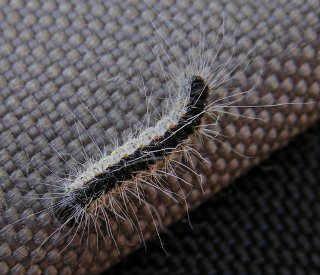London's Olympic Games spectators may suffer from oak processionary moth poisonous caterpillars
Community and Forum → Blog → London's Olympic Games spectators may suffer from oak processionary moth poisonous caterpillars
Lev Bely, 11.05.2012 20:21

The Olympic Games may be ruined with bad guests that are expected to be there right in time. Whilst the authorities are settling up missile weapons on the city roofs to protect (everybody) against potential terrorist attacks, the real threat may appear to be ordinary oak trees, exactly, poisonous caterpillars of oak processionary moth (Thaumetopoea processionea) that are sheltering there. Their toxic hairs when inhaled can cause dizziness and vomiting. Each caterpillar contains 63000 poisonous hairs that can provide misery to millions of spectators. These hairs also provoke asthma attacks, skin and throat rashes, watery eyes.
Thaumetopoea processionea moth was brought to the UK in 2006 with oak trees imported from Holland, and quickly spread over the territory. Albeit officials have already eradicated over 700 nests, caterpillars are expected to increase due to the last abnormally warm winter.
Tony Kirkham, head of the arboretum at The Royal Botanic Gardens, Kew, told that while efforts are being made, the pests are difficult to eradicate. “We use spray to keep them at bay but even the nest removals at Kew don't totally control oak processionary moths,” he said. “You can slow them down but we will never find them all. They will always keep increasing.”
Those who are about to visit the Olympics advised to stay away from caterpillars. If you notice a nest, please, inform Forest Research in the UK. If you got a rash or similar affliction, use antihistamine preparates and creams. See a doctor if you're getting worse.
NY Daily News, http://www.nydailynews.com
Photo: oak processionary moth caterpillar, Regani, http://en.wikipedia.org
All the rest posts on: UK, danger zone, ecology
Comments
New comment
Note: you should have a Insecta.pro account to upload new topics and comments. Please, create an account or log in to add comments.
* Our website is multilingual. Some comments have been translated from other languages.
Random species of the website catalog
News
- 02.03.2025: Moscow Insect Fair: New section on the Insecta.pro Website
- 31.12.2024: If you need to upload a lot of photos to Insecta.pro website
- 10.12.2024: Новое поле в «Поиске энтомологов»
New photos (28.03.2025)
Fresh from the community
- 23:09, M. Niobius: Здравствуйте. Тульская область, окт...
- 12:52, L. Bolshakov: Петр, см. там подробности: https://...
- 12:32, P. Khramov: Лавр, источник скиньте, пожалуйста....
Popular insects
Recommended blog topics
- ICZN Election of Commissioners
- A. Gordon, O. Gorbunov, V. Murzin on Russian TV in 2004
- Entomologist? What kind of job is it?
- “Demons and Butterflies—Weather predictability and predictions” by Richard A. Anthes on February 21st, Albuquerque



























